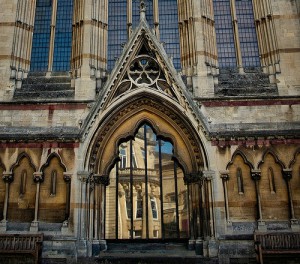And awe came upon every soul, and many wonders and signs were being done through the apostles. (Acts 2:43)
 When I was about 19 years old, I worked with a couple of Pentecostal Christians. Growing up Southern Baptist, I had never been around Christians who believed so deeply in the power of the Holy Spirit and the presence of miraculous spiritual gifts. One night, I accompanied them to a lock-in at their church. Their pastor was there, but stayed in his study, holding one-on-one meetings with individuals who wanted to confer with him. Among the lock-in participants, there was a strange mystique about these meetings. I was solemnly told not to go in unless I was prepared to be confronted in a powerful way by the Holy Spirit. I chose not to enter. I was too afraid.
When I was about 19 years old, I worked with a couple of Pentecostal Christians. Growing up Southern Baptist, I had never been around Christians who believed so deeply in the power of the Holy Spirit and the presence of miraculous spiritual gifts. One night, I accompanied them to a lock-in at their church. Their pastor was there, but stayed in his study, holding one-on-one meetings with individuals who wanted to confer with him. Among the lock-in participants, there was a strange mystique about these meetings. I was solemnly told not to go in unless I was prepared to be confronted in a powerful way by the Holy Spirit. I chose not to enter. I was too afraid.
It wasn’t fear of getting hurt. It was fear that I was approaching something greater than I could handle; something beyond my control and understanding. I guess had always related to God more like a pet than the one who upholds the universe by the word of his power (Hebrews 1:3). I was unready to be undone by the God who shakes foundations (Isaiah 6:1-5). So I dismissed the whole idea as doctrinally deficient hocus pocus. After all, these guys were sloppy with their Bibles. But looking back on the experience, whether it was hocus pocus or not, that fear seems appropriate in the presence of the God of glory.
In Acts 2:43, we see that a sense of awe (fear, terror, reverence) came upon every soul in the church as they devoted themselves to the teaching, the fellowship, the breaking of bread and the prayers. 3,000 new believers had just been added. They were witnessing many wonders and signs being done through the apostles. They knew that they were dealing with a glorious God capable of works they couldn’t predict or understand.
Awe versus Enthusiasm
Awe is different from enthusiasm. Ask a pastor or involved church member how things are doing at their church and they’ll most likely answer by outlining what they are doing, rather than what God is doing. They may tell you about a new program they’re working on or how many attend the Sunday service. They will most likely not tell you about God enabling them to boldly and effectively preach the gospel to their unsaved friends and family or God healing sick and injured people. Enthusiasm generates from what we’re doing; awe responds to what God is doing. Don’t substitute programmatic pride for humble awe at God’s glorious work among the church.
For those at the core of church life, working hardest to maintain the machine, volunteering and giving week after week, church can represent hustle rather than an awesome experience of divine power. It can become an obligatory task rather than a majestic creation from God’s cosmic hand. For those on the fringes who are uninvolved in the mechanics of church life, church can represent a pleasant side item rather than an attention-grabbing supernatural movement. For these early Christians, being the church meant being awestruck at God’s miraculous work among them.
When is the last time you felt awe in response to God and his work in the church?
Wonders and Signs Today
The apostles spoke in tongues, leaving a multitude “bewildered,” “amazed,” “astounded,” and “perplexed” (2:5-13). They healed a lame man and the people were “filled with wonder” and “amazed,” “utterly astounded” (3:1-16). They preached so boldly that they “astounded” the Jewish leadership (4:13). Two church members were publically struck dead instantly after lying to the Holy Spirit and “great fear came upon all who heard of it” (5:1-6). “Now many signs and wonders were regularly done among the people by the hands of the apostles… None of the rest dared join them…” (5:12-13).
Should we expect to see such wonders and signs today? There are basically two positions on this question. Some say that these wonders were temporary and meant only to authenticate the apostles’ ministry. Others say that they are permanent and still available to the church today. I tend to think that both are partly right.
Acts does mainly attribute these wonders and signs to the apostles’ ministry. It does not seem as though the rest of the church participated in them as often or to the same degree as the apostles. But Philip and Stephen who were not apostles also performed miracles (see Acts 6:8 and 8:6).
Passages that describe spiritual gifts (1 Corinthians 12 for example) seem to include miraculous sign gifts (utterances, healing, miracles, prophecy, tongues) alongside gifts we consider more mundane (teaching, helping, administrating), with no distinction that they were more temporary than their counterparts. Yet it doesn’t seem like we see them used very often today, especially not in the dramatic way they were used in Acts.
As I look back through my prayer journal I do see God’s work of healing, salvation, changed hearts, servants and leaders called to ministry and material provision. But these works are usually accomplished by God through the everyday ministry of Jesus’ body the church and not dramatic miracles.
Though a clear answer on this question remains elusive, here are two things we can know for certain from Acts 2:43.
- The church is united not only in activity, but also in humble response to God’s work among them. Awe came upon every soul, not just a few who were especially sensitive or involved.
- Supernatural power is unleashed within and through the church.
How Are We to Respond
The last few sermons have been about what to do as the church. This sermon is more about what to expect. As we plug into the gospel and the Holy Spirit, devoting ourselves to the teaching, the fellowship, the breaking of bread and the prayers; we can expect God to do supernatural work among us. We can expect to be awestruck at the glorious power of the gospel of Jesus Christ.
Discussion Questions
- Read Acts 2:43. Have you ever experience awe (fear, terror, reverence) at God or some work of God in your life? Share with the group.
- Have you ever experiences “wonders and signs,” miraculous events that can only be explained by divine intervention? Share with the group.
- Do you think awe is a common experience among Christians today? Why or why not?
- Do you believe that God still works in such dramatically supernatural ways among his church? What scriptures can help us think through this question? Matthew 24:23-28; 1 Corinthians 12:4-11, 27-31 will help spur discussion.
- Pray together in light of these things.






